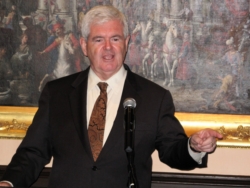Grassroots efforts can counteract secularism, Gingrich says
BOSTON -- Using Pope John Paul II as an example, former House Speaker and possible 2012 Republican Presidential candidate Newt Gingrich exhorted area Catholics to combat secularism in an Oct. 8 breakfast reception at the Union League Club hosted by Catholic Citizenship.
In his remarks, Gingrich discussed the documentary he and his wife are currently making on Pope John Paul II’s historic visit to Poland in 1979, and how the impact of that papal visit helped overthrow communism in the late Holy Father’s native country. He then analyzed the lessons that today’s American Catholics can learn from the late pontiff in combating elements in society that appear hostile to the practice of faith.
Gingrich also discussed his recent conversion to Catholicism.
“What you have seen is the steady encroachment of the state limiting the right of conscience and the right of public expression,” Gingrich said.
To counter that, Gingrich encouraged Christians to directly communicate the core democratic principles on which this country was founded.
“That’s why I start with the Declaration of Independence -- because 90-percent of the people believe it’s real,” he said.
He challenged interpretations of the Constitution which argue that separation of church and state means that religion in the public sphere should be illegal. Gingrich disagreed with those who have used the writings of Jefferson to justify the 1963 Supreme Court decision to outlaw prayer in public schools.
“It is not accurate to point to Jefferson,” Gingrich said. “People who point to Jefferson are fundamentally misreading the Danbury letter.”
Gingrich’s remarks referred to Jefferson’s 1802 response to the Danbury Baptists Association. The Baptists, a minority in Connecticut, objected to being forced to pay taxes to support a church they did not attend.
The former speaker pointed out that in the early American republic, state churches were possible because the federal Constitution did not apply to the states in those days. Therefore, an official state church was possible.
Gingrich also explained that Jefferson, through his writing of the 1787 Northwest Ordinance, believed that schools should teach religion and morality.
To combat secularism, Gingrich also encouraged Catholics to pray and work at the grassroots level, challenging organizations like local school boards.
“I think it’s the real intellectual battle that is being waged at the street level. It starts in the classroom but then it takes to the ideas of politics and activism,” said Victor Pap, Executive Director of Catholic Citizenship. “That’s where the battle against secularization must manifest itself.”
John Carvalho, a parishioner at Sts. Peter and Paul Parish at Holy Cross Church in Fall River, agreed.
“We as individuals, as citizens and constituents of every city, state, and county we belong to, need to speak up in a calm way, very cool, collected, calm, and respectful way about what we believe as Catholics. Especially as cradle Catholics, we tend to keep our faith and our Christianity secret. We can’t do that anymore,” he said.
For Gingrich, the example of Pope John Paul II shows how Catholic involvement can challenge secular causes.
In their upcoming documentary, “Nine Days That Changed the World,” Gingrich and his wife, Callista, examine the extent to which John Paul II’s visit to his native Poland influenced the overturning of a secular Communist government there in the late 20th century. The film discusses the late Holy Father’s early life under Nazism and Communism, his papal election in 1978, the papal visit from June 2-10, 1979 and follows the visit’s effects in Eastern Europe and throughout his papacy.
“I hope that ‘Nine Days That Changed the World’ will remind people that they are always capable of changing the world and that if they will open their heart to Christ and if they will simply follow their heart as witnesses to the truth they will, in fact, change the world,” Gingrich said.
Gingrich credited the pope’s popularity with the Polish people and his impact as impetus for overthrowing communism.
He said that during the visit, that when the pope said, “Let the face of God touch this earth,” the crowd responded by chanting, “We want God.”
“It was a decisive start,” Gingrich noted.
Gingrich’s words impressed those in attendance.
“It was a profound discussion of Pope John Paul II and what he did to battle that communism, that secularization, during his time, and it’s a great example of authentic, Catholic grassroots activism,” Pap said.
“To have the presence of a man like that walk the same earth that we walk on today, and then have someone who is a convert, like the speaker is, relay that back to us as cradle Catholics, and to be able to get reinvigorated and to help to come back and renew our Church, and to renew the movement we are asked to represent, is inspiring,” added Carvalho.
The former House speaker also shared details of his conversion to Catholicism with friends gathered in Boston that Thursday. Gingrich was raised a Lutheran but converted to Catholicism earlier this year.
Gingrich began attending Mass with his current wife, who is in the church choir at the Basilica of the National Shrine of the Immaculate Conception in Washington, D.C. Meanwhile, he had been speaking to the basilica’s rector about the influence of secularism on American society.
However, it was seeing the current pope, Benedict XVI, which led him to convert.
Gingrich saw the Holy Father when he attended vespers at the national basilica.
“I found him to be utterly different than the news media’s original projections,” Gingrich recalled. “This was not ‘God’s Rottweiler.’ This was not some German intellectual who was aloof and austere.”



















